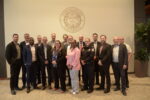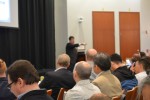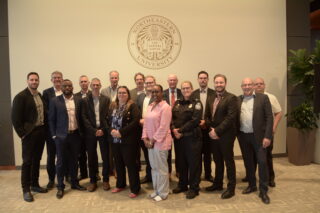News & Events
Event
CBP-ADEPT-05 Workshop on Advanced Developments Encompassing Processes and Technologies for Customs and Border Protection August 24, 2023

ALERT convened the annual Customs and Border Protection Advanced Developments Encompassing Processes and Technologies (CBP-ADEPT05) workshop on July 25 and 26, 2023 at Northeastern University.
Participants were welcomed by ALERT’s Founding Director, Michael Silevitch, who is also the Director of current DHS COE, Soft Target Engineering to Neutralize the Threat Reality (SENTRY). Opening remarks were also provided by Chelsea Thompson, Program Manager with the Office of University Programs, Science and Technology (S&T) Directorate of DHS, and Laura Parker, Senior Advisor for Sensors, also with the S&T Directorate of DHS.
Spearheaded by U.S. Customs and Border Protection (CBP)’s Portfolio Manager, David Taylor, this year’s event focused on the development and deployment of algorithms to enhance the interdiction of contraband, with the goal of improving border security. The workshop featured a comprehensive agenda with perspectives from academic researchers, national labs, and industry. Speakers shared updates on algorithms for automatic threat and anomaly recognition, CBP requirements, funding, deployment, testing, quality assurance, access to training and test data, and much more.
Click here to view all the presentations from this year’s event.
Among the presenters was ALERT Thrust Lead, David Castañón, who shared developments from his research on video analytics and anomaly detection and how it pertains to enhancing customs and border protection. Michael Silevitch shares, “The ALERT mission of anomaly detection is central to advancements in border security. Our continued development of this technology will be of significant benefit to CBP as well as to other stakeholders within DHS.”
Overall, CBP-ADEPT-05 provided an excellent opportunity for experts, stakeholders, and industry members to come together and exchange knowledge and ideas regarding the development and implementation of advanced technologies for enhancing border security and preventing the illegal transportation of contraband.
ADSA24 Focuses on Collaboration in Aviation Security November 9, 2021
This October, ALERT hosted the ADSA24 workshop, the 24th installment of the Advanced Development for Security Applications (ADSA) workshop series, which has been assembling aviation security stakeholders from academia, government, and industry since its formation in 2009. The ADSA24 workshop focused on “Advancing Collaboration for Enhanced Security,” and in accordance with this theme, the workshop’s 172 attendees communed virtually on October 5-6 for expert-led presentations, engaging discussions on emerging technologies and industry standards, and networking in breakout rooms.
The ADSA workshop series is intended to address research opportunities that may enable the development of next-generation systems for the Transportation Security Administration (TSA) and Department of Homeland Security (DHS) Science & Technology (S&T) Directorate and to facilitate collaboration and innovation between researchers from universities, national labs, and the private sector.
“An effective collaboration occurs when there is a melding of complementary skills and points of view,” said Michael Silevitch, director of ALERT. “For example, a university analyst working closely with an industrial practitioner will often result in breakthroughs in the understanding of complex phenomena.”
Distinct topics that were addressed during the ADSA24 workshop included: establishing and maintaining collaborations, addressing obstacles to collaboration (building trust, navigating conflicts of interest and legal issues), stakeholder (TSA, DHS S&T, vendors, third parties, and airlines) perspectives on collaboration, and examples of successful and unsuccessful collaborations. Those who wish to learn more about the topics covered can view and download presentations from ADSA24 and previous ADSA workshops.
The ADSA workshop series places importance on the concept of technology foraging, or the process of identifying emerging technologies, products, and systems applicable to recognized capability gaps. ALERT intentionally seeks out experts in seemingly unrelated fields to present on their innovations and best practices, so that the ALERT community may obtain new perspectives and knowledge that could be applicable to aviation security. In keeping with this commitment to technology foraging, the ADSA24 workshop featured several presentations from experts in the medical imaging field, including talks from Jiang Hsieh, retired chief scientist at GE Healthcare, and Robert Nishikawa, professor and director of the Imaging Research Division in the Department of Radiology at the University of Pittsburgh.
“The frank and open nature of the presentations and ensuing discussions makes the ADSA experience concentrated and of high value,” said Carey Rappaport, deputy director of ALERT. “And with the understanding that the audience includes the widest variety of affiliation and discipline, ADSA stimulates a free flow of ideas, often outside the boundaries of typical workshops and conferences. Security experts learn from medical researchers, and manufacturers openly exchange ideas with policy makers.”
The next installment of the ADSA workshop series, ADSA25, will be held in Spring 2022 and ALERT plans to return to the in-person format at Northeastern University in Boston, MA. The dates, topics, and format of the workshop are forthcoming.
ALERT Brings Together Stakeholders for Virtual Technology Showcase April 28, 2021
Like many events scheduled for 2020, the ALERT Technology Showcase had to be postponed due to the pandemic. As operations shifted online, ALERT leadership saw an opportunity to expand upon the ALERT Technology Showcase to better demonstrate the impact and transition of its research to the homeland security enterprise.
Leading up to the showcase, ALERT launched the SPARC (Seminars to Promote ALERT Research and Collaboration) webinar series—giving attendees a preview and deep-dive into some of the Center’s technology solutions—and shifted the ALERT Technology Showcase, which is typically held in person, to a fully virtual format. The newly imagined two-day event was successfully held on April 21 – 22 and brought together 137 stakeholders from across academia, industry, and government for presentations, demonstrations, and panel discussions that highlighted ALERT’s many research accomplishments, technologies, and collaborations.
“Shifting to the virtual format was a difficult challenge,” said Michael Silevitch, ALERT Director. “I want to commend the effort of the entire ALERT team to accomplish this important task. Their efforts went above and beyond the normal preparation for this type of event.”
The keynote address on the first day of the showcase was delivered by LaFonda Sutton-Burke, the Port Director for Customs and Border Patrol (CBP) at Los Angeles International Airport, who presented at ALERT’s inaugural CBP-ADEPT Workshop in 2018. On the second day, the keynote address was provided by Rebecca Medina, Director of the Office of University Programs at the Department of Homeland Security.
Over the course of the ALERT Technology Showcase, attendees observed nine technology demos, including:
- Simulated Air Cargo Skids Task Order – Presented by Carl Crawford, Csuptwo LLC.
- CLASP (Correlating Luggage and Specific Passengers) – Presented by Deanna Beirne, Northeastern University; David Castañón, Boston University; Octavia Camps, Northeastern University; Henry Medeiros, Marquette University; and Rich Radke, Rensselaer Polytechnic Institute.
- Autonomous Raman System for the Analysis of Trace Residues on Surfaces – Presented by Eric Miller, Tufts University; and Romain Blanchard, Pendar Technologies.
- UAV-Based Sensors for the Detection of Threats – Presented by Otto Gregory, University of Rhode Island.
- Tool and Method for Simulating Explosives Particle Adhesion – Presented by Steve Beaudoin, Purdue University
- Distributed, Low-Cost Multi-Sensor Detection, Imaging and Analysis Network – Presented by Scott Howard, University of Notre Dame
- Astrophysics Multi-View CT – Presented by David Castañón, Boston University; and Brett Tally, Astrophysics Inc.
- Zero Power Infrared Wireless Sensor Node in Collaboration with United Technology Corporation (UTC) – Presented by Matteo Rinaldi, Northeastern University; Zhenyun Qian, Northeastern University; and Sungho (Ryan) Kang, Northeastern University.
- SCHMOO (Safe Control of Hazardous Materials or Others Onsite) – Presented by Jimmie Oxley, University of Rhode Island.
In addition to the technology demos, the event also included networking sessions in virtual breakout rooms where participants could approach presenters with follow-up questions and connect with one another, as well as two engaging panel discussions on the following topics:
- ALERT Alumni Success Stories – Moderated by Carey Rappaport, Northeastern University and featuring David Benirschke, University of Notre Dame; Limor Martin, SeeTrue AI; Alex Showalter-Bucher, DarkPumpkin AI (formerly with MIT Lincoln Lab); and Melissa Sweat, Defense Threat Reduction Agency (DTRA).
- ALERT as an Emeritus Center – Moderated by Michael Silevitch, Northeastern University and featuring Jennifer Dy, Northeastern University; John Fortune, Department of Homeland Security; Matthew Merzbacher, Alameda County Community Food Bank; Fernando Quivira, Engineering Consultant; and Carey Rappaport, Northeastern University.
While in-person events are generally preferred, the virtual format of the ALERT Technology Showcase resulted in a turnout on par with that of ALERT’s previous showcase, but with greater flexibility and convenience for attendees who could log into the event from anywhere. ALERT plans to hold its next event, the ADSA23 Workshop on “Autonomous Security Systems” virtually as well—splitting the conference across three sessions (11:00 a.m. to 1:00 p.m. EDT) on May 4, 11, and 25.
Virtual ADSA22: Improve Aviation Security by Reducing Operator Cognitive Load December 17, 2020
Unlike previous workshops in the Advanced Development for Security Applications (ADSA) series, this fall’s ADSA22 workshop, “Reducing Operator Cognitive Load in Aviation Security Equipment” was fully virtual and held over the course of four sessions (Nov. 17, Nov. 24, Dec. 1, and Dec. 8). While the change in format was due to the COVID-19 pandemic, it allowed for more robust attendance and engagement, especially from international attendees, as aviation security stakeholders from across academia, government, and industry were able to participate without having to travel.
These virtual sessions addressed the important topic of reducing operator cognitive load. Within aviation security, many security roles require continuous attention; workshop attendees gathered to discuss solutions to prevent vigilance decrement. The ADSA22 workshop addressed solutions to this problem, such as automating operator functions within aviation security, the adaptability of machine learning algorithms, implementing open architectures and third-party involvement, and emerging hardware and software technologies.
“As with most ADSA conferences held in the past, the virtual format held a plethora of technical information that was informative and engaging. This was all kicked-off by the RCA Assistant Administrator (Austin Gould) who, among other points of interest, made a strong note of awareness of COVID-19 and how TSA is actively adjusting technology endeavors to incorporate this vital component,” said Frank Cartwright, Capability Development & Integration (CDI) Branch Manager, Requirements & Architecture Division, TSA. “I don’t think the virtual format will completely replace the intangible benefits of a ‘live’ ADSA conference, but it truly pulled in all the main components which draw this community together.”
The workshop also focused on perspectives from the Transportation Security Administration (TSA) and Department of Homeland Security (DHS) Science & Technology (S&T) Directorate, and other aviation security stakeholders, and included thought-provoking talks from leaders outside aviation security—including professionals from the fields of sociology and medical imaging.
An important role of the ADSA Workshop series is technology foraging. ALERT intentionally looks for speakers in seemingly unrelated fields to present their technologies, because it is believed that can learn from these fields and technologies, and discover valuable applications for aviation security.
ALERT has hosted the ADSA Workshop series since 2009. Originally named the “Algorithm Development for Security Applications” Workshop series, the name was changed following ADSA10 in 2014 to reflect how the scope of the workshop series expanded beyond algorithm development. The ADSA Workshop series is intended to address research opportunities that may enable the development of next-generation systems and to facilitate collaboration and innovation between researchers from academia, national labs, and industry.
Dates for the spring workshop, ADSA23, have been set. ALERT stakeholders are encouraged to mark their calendars for May 4, 11, and 25—more information on the workshop and registration details will be forthcoming. ADSA23 will address the topic of Autonomous Systems for Aviation Security.
The final reports and presentations from ADSA22, and previous ADSA workshops are available to download here.
Additionally, ALERT will be hosting a series of half-hour seminars to allow deep-dives into specific topics related to aviation security. The seminars will begin in February 2021. Members of the ADSA community are encouraged to share specific topics of interest for these seminars with ALERT.
ALERT would like to thank all the presenters and attendees for making the ADSA22 workshop successful. In particular, ALERT would like to thank Frank Cartwright (Capability Development & Integration (CDI) Branch Manager, Requirements & Architecture Division, TSA) for coordinating TSA speakers, including an engaging keynote address from Austin Gould (Assistant Administrator for Requirements and Capabilities Analysis, TSA) and Diederik Stolk (Founding Partner, Goldsworthy, Stolk & Associates) for providing valuable insight on transforming the workshop into a virtual event.
ALERT Launches SPARC Webinars June 30, 2020

ALERT’s free online summer webinar series, SPARC (Seminars to Promote ALERT Research and Collaboration), kicked off on June 24th! SPARC aims to provide a preview of the ground-breaking technologies to be demonstrated at the ALERT Technology Showcase and will focus on ALERT’s work with industry and government stakeholders.
The first webinar of the series was presented by Professor Eric Miller of Tufts University and principal investigator for project R4-B.2, and Dr. Dan Strellis of Rapiscan Systems. Professor Miller and Dr. Strellis discussed their work in a presentation titled, “On the fusion of X-ray data types for enhanced materials characterization”. They also highlighted the successful collaboration between ALERT and Rapiscan. The webinar was well attended with 70 participants from industry, academia, and government institutions.
The webinar recording will be uploaded on the event webpage, along with the presentation slides. Please check back on the event webpage at a later time!
For more information on the upcoming webinars, please visit https://alert.northeastern.edu/sparc/.
If you are interested in attending any of the webinars or have any questions, please reach out to Tiffany Lam at [email protected] for more information.
The Virtual Hackathon to Combat Human Trafficking will take place March 28th and 29th! March 23, 2020
Our fellow Center of Excellence, the Criminal Investigations and Network Analysis (CINA) Center, Blue Compass, and the TraCCC Center at George Mason University are hosting a virtual hackathon to combat child sexual exploitation and labor trafficking. For more information on the event and how to register, please visit their event page here.
Save the Date: ALERT Technology Showcase and ADSA22 December 18, 2019

ALERT is pleased to announce the upcoming dates for the following two exciting events at Northeastern University in Boston, MA:
- The second ALERT Technology Showcase on May 5th, 2020
- The 22nd workshop for Advanced Development for Security Applications (ADSA22) on May 6-7th, 2020
ALERT Technology Showcase, May 5, 2020
This year’s Showcase will feature presentations and demonstrations of ALERT research results and tools from select ALERT projects and select industry members. Attendees will also be able to interact with individual project researchers, students, and collaborators to learn more about their research throughout the day.
You can find out more about our Technology Showcase from last year’s event here: https://alert.northeastern.edu/event/technology-showcase/.
ADSA22 Workshop, May 6-7, 2020
ADSA22 will address the topic of “Reducing the Cognitive Load of Operators of Aviation Security Equipment.” Specific topics that will be addressed include:
- Automating operator functions, reducing vigilance decrement of operators and TIP
- Increasing positive predictive value of automated threat recognition (ATR) algorithms
- Creation and validation of synthetic images and simulants for training and testing
- Target shifting and insider threats
- Adaptability of machine learning algorithms
- Technology readiness level (TRL) of third-party developments
- Terrorist Be Gone: How do we get rid of terrorists? How do we allow passengers to just walk onto the plane?
- Cybersecurity – prevention and mitigation and ethical issues with image retention and biased scanning
- Emerging technologies
More information on ADSA22 can be found here: https://alert.northeastern.edu/transitioning-technology/adsa22/
If you have any questions on the ALERT Technology Showcase or ADSA22 or would like to request that invitations be extended to others in your organization, please contact Tiffany Lam, Northeastern University, [email protected]
Save the Date for CBP ADEPT03! December 18, 2019

Please note: CBP-ADEPT-03 was originally scheduled to take place July 8-9 but has been postponed and the dates are TBA.
The third workshop on Advanced Developments Encompassing Processes and Technologies for Customs and Border Protection (CBP-ADEPT-03) will be held July 8-9, 2020, at Northeastern University in Boston. The workshop will address Creating Effective Engagements with CBP.
This workshop is a spinoff of the ADSA workshops that have been held to address aviation security. The Department of Homeland Security, Customs and Border Protection (DHS-CBP) has funded a new series of workshops dedicated to CBP. The format of the workshop is designed to encourage discussion during presentations. We look forward to seeing everyone in July – more details to follow soon.
More information on CBP-ADEPT-03 can be found here: https://alert.northeastern.edu/transitioning-technology/cbpadept/cbp-adept-03/
Learn more about past ADEPT events here. https://alert.northeastern.edu/transitioning-technology/cbpadept/
Annual Student Pipeline Industry Roundtable Event (ASPIRE) 2020 December 18, 2019
The Annual Student Pipeline Industry Roundtable Event (ASPIRE) will be held on April 8th, 2020 from 11:30AM-5:00PM at the Cabral Center, John D. O’Bryant African American Institute on the Northeastern University, Boston Campus. The event is hosted by the ALERT (Awareness and Localization of Explosives-Related Threats) & Gordon-CenSSIS (The Bernard M. Gordon Center for Subsurface Sensing and Imaging Systems).
ASPIRE provides an optimum setting for dialogue among members of the academic, industrial and government communities and also provides networking opportunities for ALERT students looking for internships, co-op opportunities and full-time jobs. The event is targeted at undergraduate and graduate students in the fields of engineering, science, and computer & information sciences interested in careers related to homeland security.
The ASPIRE features representatives from our Gordon-CenSSIS and ALERT industry and government partners. Typical event partners expected are American Science & Engineering, Department of Homeland Security Science and Technology, Raytheon Company, U.S Customs and Border Protection and More.
Registration
If you are a student interested in attending, please reach out to Tiffany Lam: [email protected].
If you are an industry or government representative interested in attending, please reach out to Emel Bulat: [email protected].
ALERT Hosts IAB Meeting and ADSA21 Workshop December 18, 2019

Last month, the Awareness and Localization of Explosives-Related Threats (ALERT) Center of Excellence held its annual Industrial Advisory Board (IAB) Meeting and ADSA21 Workshop. ALERT’s annual IAB Meeting and other members-only events provide industrial members with the opportunity to network with other industrial members, faculty from ALERT’s partner institutions, and representatives from local, state, and federal government institutions. The ADSA Workshop series is intended to encourage open discussion of the challenges and opportunities related to the development of next-generation security systems and to facilitate collaboration and innovation between researchers from academia, national labs, and industry.
Over the three days of events, more than 150+ attendees from academia, DHS, TSA, government, and ALERT’s Industrial members and more participated in presentations, panel discussions and keynote talks. The week’s events started with the IAB meeting on November 4th at the Northeastern Innovation Campus in Burlington, MA. As the most attended IAB yet, this year’s agenda included a keynote address from Len Polizzotto, Partner at the Practice of Innovation, on maximizing the Innovation Process, utilizing some interesting techniques to keep companies moving in the right direction. ALERT Researcher, Professor Matteo Rinaldi’s presentation on Near-Zero Power Sensors was extremely well received with DHS S&T requesting further information to initiate the next steps for potentially providing additional funding for the project.
IAB attendees also took an in-depth tour of the Northeastern Drone Test Facility and the ALERT Video Analytics Lab. The day concluded with a Student Poster session and networking reception. Thirteen students, both undergraduate and graduate, presented their current research projects while networking with industrial members.
The topic of practicing and supporting innovation continued throughout the week on November 5th & 6th at ADSA21, which addressed the theme of Effective Integrated Systems for Aviation Security. During the two days of workshops, subject matter experts and leaders discussed defining and developing effective integrated systems including human operators, detection versus deterrence versus displacement, and the role of interconnectivity with open architectures, amongst others. In particular, attendees highlighted the Day One Q&A session, overall TSA presence and the introduction of machine learning to projects as their favorite moments during the two days of workshops.
We’re looking forward to the next ADSA Workshop (ADSA22) which will be held at the same location on May 6-7, 2020. The theme of the next workshop will be “ Reducing Cognitive Load of Operators of Aviation Security Equipment.”
To learn more about ALERT industrial membership, please see the Benefits of Collaboration, or contact our Industrial and Government Liaison Officer, Ms. Emel Bulat at [email protected].

